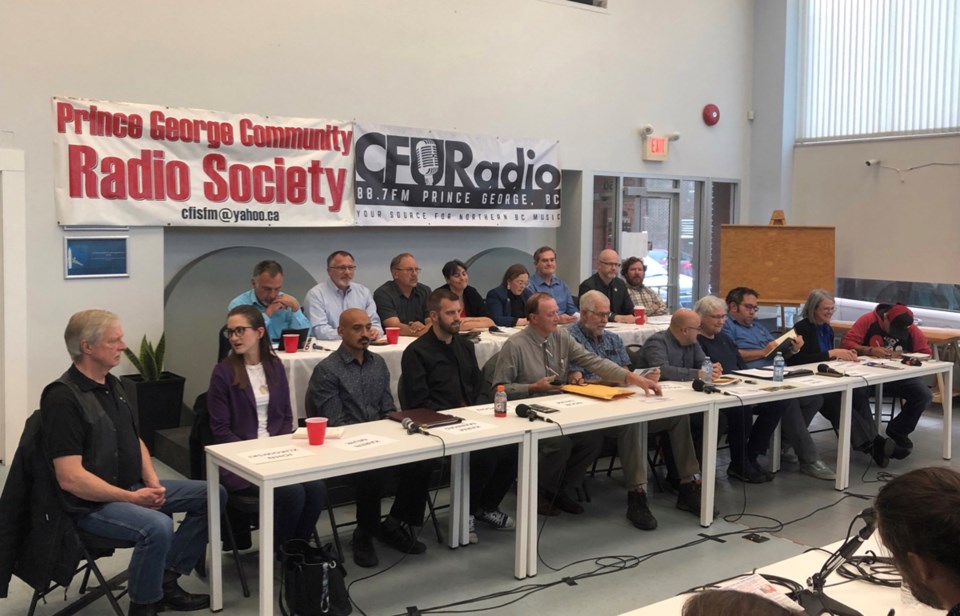Prince George city council candidates were given a tall task on Wednesday night: address the homelessness crisis and housing shortage in 30 seconds or less.
Nineteen of the 20 candidates running for Prince George city council took part in an all-candidates forum cohosted by CFUR, CFIR and the Citizen on Wednesday night. The forum was the last public all-candidates forum ahead of the general election on Saturday.
City council Tim Bennett, Richard Cook, Garth Frizzell, Doug Jeffery, Trudy Klassen, Colleen Mahoney, Karm Manhas, Wesley Mitchell, Karen Muir, Ron Polillo, Cori Ramsay, Kyle Sampson, Susan Scott, Paul Serup, Brian Skakun, James Steidle, Chris Stern, Cameron Stolz and John Zukowski were given 30 seconds each to answer two questions during the forum. Candidate Nour Salim was not at the forum.
HOUSING AND HOMELESSNESS
The city has and needs to continue advocating for the provincial and federal governments to step up to address the problems, Skakun said.
“We can’t do it alone, we don’t have the resources to do it alone,” he said.
The 50-unit housing project operated by Connective on First Avenue is a great example of what the city can do to bring supportive housing to Prince George, Stolz said. The city provided the land for the project, which was funded by BC Housing.
The other side of the issue is to make sure the city’s official community plan and zoning bylaws encourage a mix of more affordable housing options, he added.
The first step in addressing homelessness is having an accurate count of the number of people living on the city’s streets, Stern said.
“Housing and homelessness are related, but not the same issue,” Mahoney said.
Changing the OCP and bylaws to allow more mixed-up, denser housing in neighbourhoods will increase the city’s supply of affordable housing, she added.
Ramsay brought forward a motion to city council, calling for city administration to prepare a report looking at what tools and initiatives are available to the city, including those used in other municipalities, to address the issue.
Jeffrey said many first-time homebuyers would be open to buying a tiny home – a house smaller than 800 sq. feet. The city could look at ways to facilitate tiny home development as a way to allow people affordable options to get into the real estate market.
Frizzell said urgent action is needed by the city to address the issues. The new council should appoint a select committee to assess the situation and propose projects for the city to seek grants to support.
“We have massive problems and we don’t have a lot of time to fix them,” he said.
Creative solutions are needed to address the city’s homelessness issue, Steidle said. The Four Seasons Pool building had heat and bathrooms, it could have been used as an emergency shelter, he said. Instead, the city demolished it.
“We could have had people sleeping in there,” Stiedle said.
The city needs to advocate and support the creation of new shelters and affordable housing, Mitchell said.
The city had 168 unhoused people as of the last count conducted in the city, Klassen said. At a cost of $28,000 each to house them, that would cost the city $4.7 million annually, she said.
“That is less than 10 per cent of our policing budget,” Klassen added.
ECONOMIC DEVELOPMENT
Prince George is not making the best use of many of its economic assets, from the free trade zone at the airport to the educational centres of UNBC and the College of New Caledonia, Zukowski said.
“There are many things in Prince George we are not maximizing to their full potential,” he said.
City hall needs to reduce barriers to new businesses coming to the city, and reduce the hurdles for existing businesses to expand, Muir said.
“(And) we need to be a vibrant community that attracts skilled people,” she said.
Increasing the city’s local food production would not only improve local food security, but create new jobs and local business opportunities, Manhas said.
“The number one step we can take is to work with our provincial partners,” Sampson said. Attracting and recruiting new, sustainable industries to the city will be best achieved when working with the provincial government, he said.
“The city has to be a place that’s open to business,” Serup said.
The city needs to ensure that things like building permits are processed quickly, and the safety and social issues downtown need to be addressed to create a welcoming environment for businesses and their customers, he added.
The city needs to promote training in new, green industries, Cook said. That’s the future of the global economy, and Prince George’s youth need to be prepared to embrace it.
“We need to fix our downtown and help our downtown,” Polillo said.
Promoting economic diversity and streamlining approvals processes at city hall are also needed, he added.
“The city’s economic development department is working with businesses and to attract new industries,” Scott said. “Prince George is well-positioned to be a major supplier of hydrogen fuel.”
The city should be consulting with the public, business leaders and industry on ways to grow the city’s economy, Bennett said. But the city also needs to focus on offering the amenities and quality of life to “recruit people to our community, and keep them here.”



